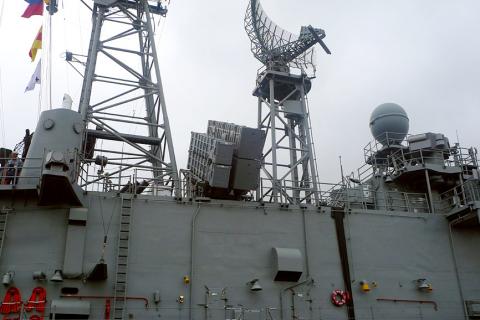Taiwan has for the first time deployed cruise missiles capable of striking key military bases along China’s southeastern coast, media reported yesterday.
Mass production of the indigenous Hsiung Feng-IIE (HF-2E), which has a reported range of 650km, has been completed and the missiles have come into service, the Liberty Times (the Taipei Times’ sister newspaper) reported, citing an unnamed military source.
The Ministry of National Defense (MND) declined to comment on the report, but the paper said the project, codenamed “Chichun” (“Lance Hawk”), cost about NT$30 billion (US$1.02 billion).

Photo: Lo Tien-pin, Taipei Times
Meanwhile, a legislative -committee yesterday approved a bill asking the navy to equip a new type of fast attack missile boat being developed under the “Hsun Hai” (“Swift Sea”) program with HF-2E missiles.
Chinese Nationalist Party (KMT) Legislator Lin Yu-fang (林郁方) told a Foreign and National Defense Committee meeting that stealth Hsun Hai missile corvettes equipped with HF-2Es could launch retaliatory attacks on Chinese military targets.
He said attacks from the sea provided the advantage of un-predictability, with better range and angles of attack than land-based launchers.
Lin submitted a bill requesting the navy equip the 450 tonne fast attack missile boats with HF-2Es.
The bill was approved by the committee.
Deputy Minister of National Defense Chao Shih-chang (趙世璋) told the committee that the military agreed to evaluate the proposal.
Lung Teh Shipbuilding Co won a bid to build prototypes of the fast attack missile boat, with plans for completion by the end of 2014. According to design plans, the corvette will also be equipped with HF-3 supersonic anti-ship missiles.
Meanwhile, Lin said a decision by the ministry to house P-3C marine patrol aircraft at Pingtung Airbase would cause delays in delivery.
Taiwan has procured 12 P-3Cs from the US, with the first six to be delivered next year, five in 2014 and the last one in 2015.
However, Lin alleged that construction of the hangars at Pingtung Airbase had been delayed until 2017, which he said could force a delay in the deployment of the P-3Cs — aircraft that would play a crucial role in detecting submarines.
Chao denied there would be any delay, adding that the aircraft would use existing hangars and maintenance systems at Pingtung Airbase.

Japanese footwear brand Onitsuka Tiger today issued a public apology and said it has suspended an employee amid allegations that the staff member discriminated against a Vietnamese customer at its Taipei 101 store. Posting on the social media platform Threads yesterday, a user said that an employee at the store said that “those shoes are very expensive” when her friend, who is a migrant worker from Vietnam, asked for assistance. The employee then ignored her until she asked again, to which she replied: "We don't have a size 37." The post had amassed nearly 26,000 likes and 916 comments as of this

US President Donald Trump said "it’s up to" Chinese President Xi Jinping (習近平) what China does on Taiwan, but that he would be "very unhappy" with a change in the "status quo," the New York Times said in an interview published yesterday. Xi "considers it to be a part of China, and that’s up to him what he’s going to be doing," Trump told the newspaper on Wednesday. "But I’ve expressed to him that I would be very unhappy if he did that, and I don’t think he’ll do that," he added. "I hope he doesn’t do that." Trump made the comments in

Tourism in Kenting fell to a historic low for the second consecutive year last year, impacting hotels and other local businesses that rely on a steady stream of domestic tourists, the latest data showed. A total of 2.139 million tourists visited Kenting last year, down slightly from 2.14 million in 2024, the data showed. The number of tourists who visited the national park on the Hengchun Peninsula peaked in 2015 at 8.37 million people. That number has been below 2.2 million for two years, although there was a spike in October last year due to multiple long weekends. The occupancy rate for hotels

A cold surge advisory was today issued for 18 cities and counties across Taiwan, with temperatures of below 10°C forecast during the day and into tonight, the Central Weather Administration (CWA) said. New Taipei City, Taipei, Taoyuan and Hsinchu, Miaoli and Yilan counties are expected to experience sustained temperatures of 10°C or lower, the CWA said. Temperatures are likely to temporarily drop below 10°C in most other areas, except Taitung, Pingtung, Penghu and Lienchiang (Matsu) counties, CWA data showed. The cold weather is being caused by a strong continental cold air mass, combined with radiative cooling, a process in which heat escapes from